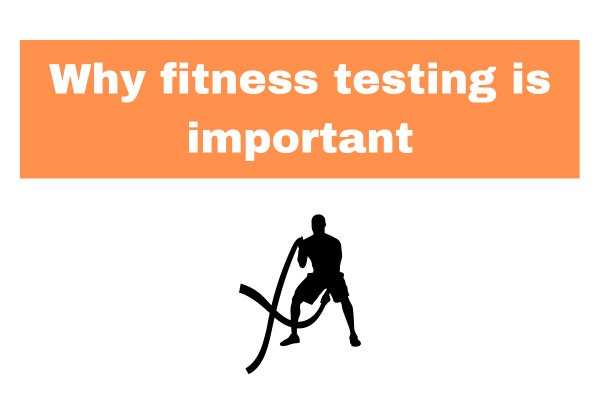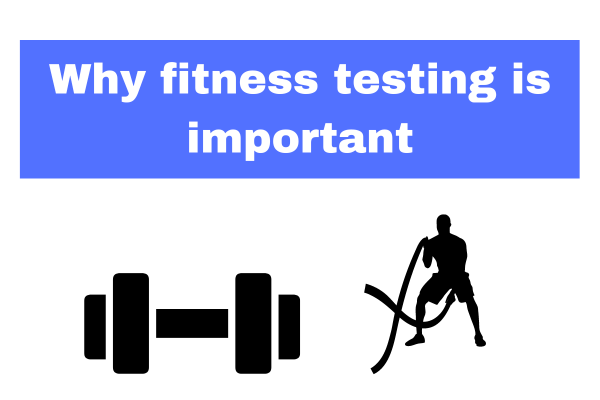Introduction: Why fitness testing is important
In the pursuit of a healthier and more active lifestyle, fitness testing plays a crucial role that often goes overlooked. Fitness testing involves assessing various aspects of physical fitness, such as cardiovascular endurance, muscular strength, flexibility, and body composition. While it might seem like a task reserved for athletes and fitness enthusiasts, the truth is that fitness testing is important for everyone. In this blog, we will explore why fitness testing matters and how it can benefit individuals of all ages and fitness levels.
Understanding Fitness Testing
Before we delve into the reasons for its importance, let’s grasp the concept of fitness testing. Fitness tests are designed to measure different components of physical fitness, providing valuable insights into an individual’s current state of health and fitness. These tests are conducted using standardized methods, allowing for accurate comparisons and tracking of progress over time.
Reasons Why Fitness Testing Is Important
Baseline Assessment and Goal Setting
Fitness testing provides a baseline assessment of your current fitness level. This information serves as a starting point from which you can set realistic and achievable fitness goals. Whether your aim is to lose weight, improve cardiovascular health, or build muscle strength, knowing where you stand enables you to create a tailored fitness plan that aligns with your objectives.
Personalized Exercise Programs
One of the key benefits of fitness testing is its ability to inform the design of personalized exercise programs. Different individuals have varying strengths and weaknesses. Fitness tests help identify areas that require improvement and guide the selection of exercises that address specific needs. This tailored approach to exercise enhances efficiency and maximizes results.
Tracking Progress
Regular fitness testing allows you to track your progress accurately. Seeing improvements over time serves as motivation to stay committed to your fitness routine. Whether it’s an increase in the number of push-ups you can do or a reduction in your 1-mile run time, tangible progress validates your efforts and encourages you to keep pushing forward.
Preventing Overtraining and Injuries
Overtraining can lead to burnout and injuries, hampering your fitness journey. Fitness testing helps identify signs of overtraining by comparing your performance to previous results. If you notice a sudden decline in performance, it could be an indicator that you need to adjust your training intensity or give your body more time to recover.
Health Monitoring
Fitness tests can shed light on your overall health status. For example, tests measuring body composition provide insights into the distribution of muscle and fat in your body. This information is valuable for assessing your risk of certain health conditions, such as obesity or metabolic disorders. Regular testing can alert you to potential health concerns that might otherwise go unnoticed.
Motivation and Accountability
Knowing that a fitness test is approaching can provide an extra dose of motivation to stick to your exercise routine. The anticipation of seeing improvements can keep you committed to your goals. Moreover, sharing your results with a fitness professional, trainer, or even friends and family adds a layer of accountability that encourages consistency.
Adjusting Training Strategies
As your fitness level evolves, so should your training strategies. Fitness testing helps you identify when it’s time to adjust the intensity, duration, or type of exercise you’re engaging in. This prevents plateaus and ensures that you continue to challenge your body, leading to continuous improvement.
Evidence-Based Decision-Making
Fitness testing is grounded in scientific principles. The data collected from these tests provide evidence that guides decision-making. Whether it’s adjusting your diet, altering your workout routine, or incorporating new exercises, you can make informed choices based on quantitative data rather than guesswork.
FAQs About Why fitness testing is important
Who can benefit from fitness testing?
Fitness testing is beneficial for individuals of all ages and fitness levels. Whether you’re a beginner looking to start an exercise routine or an experienced athlete aiming to enhance performance, fitness testing provides valuable information to tailor your approach.
What types of tests are included in fitness testing?
Fitness testing typically includes assessments of cardiovascular endurance, muscular strength, flexibility, and body composition. Examples of these tests include the 1-mile run, push-up test, sit-and-reach test, and body fat percentage measurement.
How often should I undergo fitness testing?
The frequency of fitness testing depends on your goals and progress. For beginners, conducting tests every few months can help track initial improvements. As you become more experienced, yearly or bi-yearly testing can help monitor long-term progress and adjustments.
Do I need to be physically fit to undergo fitness testing?
Not at all. Fitness testing is designed to assess your current level of fitness and help you set achievable goals. It’s perfectly fine to start testing even if you’re not currently active; in fact, it can be a great motivator to see improvements over time.
Can I conduct fitness tests at home?
Many fitness tests can be conducted at home with minimal equipment. However, for accurate and consistent results, it’s recommended to perform tests under controlled conditions and with proper guidance, especially if you’re new to fitness testing.
How do fitness tests help with goal setting?
Fitness tests provide baseline measurements of your current abilities. With this data, you can set realistic and attainable fitness goals that align with your strengths and areas for improvement. Tracking progress through subsequent tests helps you stay focused on your objectives.
Can fitness testing help prevent injuries?
Yes, fitness testing can contribute to injury prevention. By identifying weaknesses or imbalances in your physical fitness, you can tailor your exercise routine to address these areas. This helps reduce the risk of injuries caused by overworking certain muscle groups while neglecting others.
Can fitness testing identify health risks?
Certain fitness tests, such as body composition assessments, can provide insights into health risks associated with factors like obesity or high body fat percentage. However, while fitness testing can raise awareness of potential concerns, it’s not a substitute for comprehensive medical evaluations.
How do fitness tests encourage accountability?
Knowing that you’ll be undergoing fitness testing can create a sense of accountability. Sharing your results with a fitness professional or trainer can motivate you to stick to your exercise routine and make improvements between tests.
What if I’m disappointed with my initial fitness test results?
Initial results serve as a starting point for improvement. Instead of becoming discouraged, view these results as a foundation upon which you can build. With consistent effort and a well-designed fitness plan, you’ll likely see positive changes in subsequent tests.
Can I use fitness testing to track progress in specific areas?
Absolutely. Fitness testing can help you track progress in specific areas such as cardiovascular endurance, muscular strength, or flexibility. By focusing on one aspect at a time, you can set targeted goals and witness improvements.
Is fitness testing only for serious athletes?
No, fitness testing is for everyone interested in improving their physical health and well-being. It’s a tool that helps individuals set goals, track progress, and make informed decisions about their fitness journey, regardless of their fitness level or athletic background.
Conclusion: Why fitness testing is important
Fitness testing is a valuable tool that empowers individuals to take control of their health and well-being. By providing insights into various aspects of physical fitness, these tests facilitate goal setting, personalized exercise planning, progress tracking, and health monitoring. Whether you’re a beginner or a seasoned fitness enthusiast, incorporating fitness testing into your routine can enhance the effectiveness of your efforts and contribute to a healthier and more active lifestyle. Remember, fitness testing isn’t just for athletes; it’s for anyone committed to improving their overall quality of life through better health and fitness.
Visit the link to read more: https://family-fitness-fun.com/why-is-fitness-important-for-everyone-the-significance-of-fitness-for-every-individual/





